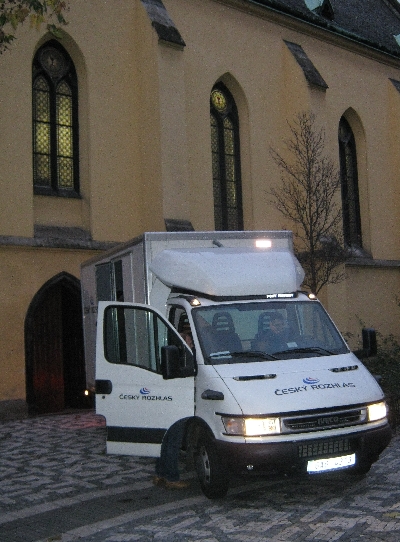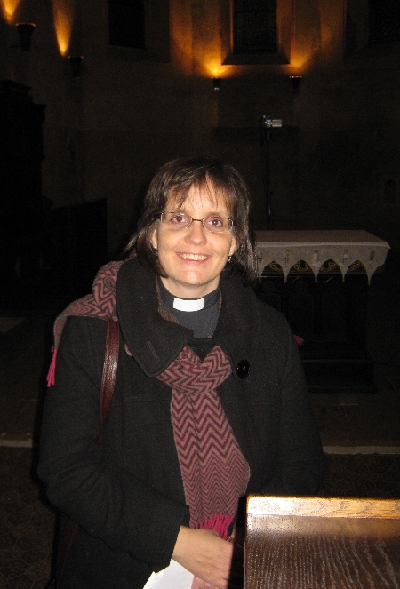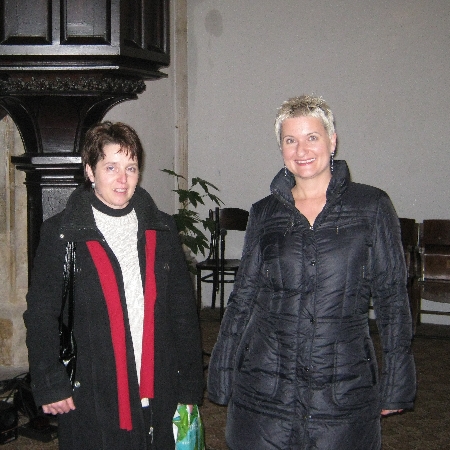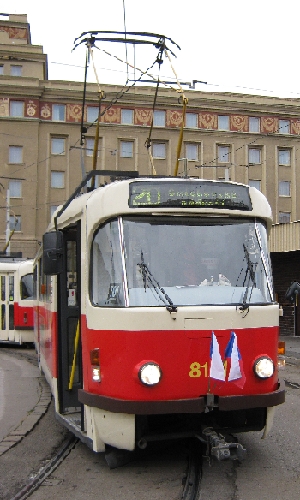
‘Good King Wenceslas looked out, on the Feast of Stephen’. So goes the opening lines of the well-known Christmas carol, the words being the work of the nineteenth century hymnwriter John Mason Neale. The carol is based on the life of the historical Saint Wenceslas, Duke of Bohemia (907-935), who is known in Czech as Svatý Václav, the patron saint of the Czech Republic.
Out of the blue, on Thursday 4th November, I got a phone call from Canon Stephen Shipley, Senior Producer for BBC Radio Religion & Ethics, saying he wanted to record a service, to be broadcast by BBC Radio 4 on Sunday 26th December 2010 – the Feast of Stephen. His idea was that the service should focus on the twin themes of St. Stephen and St Wenceslas. And because there is a large statue of the Czech saint at the far end of Václavské námestí / Wenceslas Square and he is buried in St Vitus Cathedral, he wanted to record it in Prague.
The following days were marked by a whole series of phone calls and emails, back and forth, as we tried to pull the project together. But by the end of the evening of Wednesday 24th November, we had successfully recorded sufficient material to turn the concept outlined in Stephen’s original phone conversation with me twenty days earlier, into a reality that will be broadcast ‘On the Feast of Stephen’.
As well as speaking with me about his concept for this recorded service, Stephen Shipley had also made contact with a Czech Ecumenical Choir called Naši pevci / ‘Our voices’, who had been recommended to him and were very keen to be part of the project. As the choir normally practice on a Wednesday evening, this seemed to both them and me to be the best day of the week to record the service and two Wednesdays in early December were both pencilled in as being suitable.
But we then discovered that the technical crew from Czech Radio, with whom the BBC have a reciprocal agreement, could not do either of these dates. Thus the recording had to be far earlier than originally envisaged, eventually taking place on the evening of Wednesday 24th November. Fortunately the Church was available that evening which was another piece of the jigsaw which had to be fitted in.
Whilst I could find volunteers from the regular congregation to read and lead intercessions, one thing I struggled with was Stephen Shipley’s request that there be two different voices leading the service – one to give some short reflections on the Biblical passages and the lives of St. Stephen and St. Wenceslas, and one to link the various parts of the service together. And he was quite keen that one of them should speak English with a Czech accent!
It was during one of our phone conversations, little more than a week before the recording was due to take place, that I suddenly had a brainwave – why not ask Petra Hanova? Petra is a Czech former member of the St. Clement’s congregation who went forward to train for ordination in the Church of England. I had never met her but many longer-standing members of the congregation spoke highly of her. All I did know was that she was now married to a fellow Anglican priest Guy Elsmore, and was working in the Diocese of Liverpool.
Fortunately, Stephen liked the idea and agreed to phone Petra to see if she was willing to take part and also be willing to write three or four reflections for the service over the weekend, thus leaving me to be the link person holding everything together. Amazingly, despite the short notice, Petra was very happy with our idea and agreed to fly to Prague on Tuesday 23rd November to be ready for the recording the following day. Petra’s parents still live here and she was able to stay with them and combine the recording with a family visit.
On the evening of Monday 22nd November, I drove out to the airport to meet Stephen Shipley who flew in from Manchester. He stayed in the guest bedroom of the Chaplaincy flat for the next three nights and from the following morning until the middle of Wednesday afternoon, we worked continuously putting the various pieces of the jigsaw together into a coherent service.
As well as ‘Good King Wenceslas’, to be sung by both choir and congregation, there were several choir items in both Czech and English, two other congregational carols, three Bible readings re-telling the story of Stephen, intercessions, together with four reflections from Petra. Initially, the various items all seemed rather disparate. But slowly, Stephen was able to sort them into a coherent running order. Having done so, I then had to write the text that I was going to use to link the whole service together.
It was little more than hour before we needed to leave the flat in order to reach St. Clement’s Church and let the Czech Radio technical guys into the building to set up for the recording, that I finally finished printing off ten copies of the complete text of the service, together with running orders and hymn sheets for the congregation. I would be lying if I didn’t say that it was all a little stressful!
Stephen and I got to St. Clement’s Church just before 4.00 pm to find the Czech Radio technical crew waiting and ready to go. Fortunately, they had previously recorded a Czech service in the building and therefore had a fairly clear idea how to set things up to obtain a good sound balance. Once they were happy that they had access to everything they needed, Stephen and I were able to disappear for a quick coffee and a final check through the text of the service.

We returned to the Church around 5.45 pm to find Petra Elsmore sitting quietly in the pew waiting for us. Very soon afterwards, Lucie Nováková the organist and Lydie Härtelová the Choir Director arrived. Lydie is not very fluent in English but, because her husband is German, speaks German very well. She thus pushed my ‘bisschen Deutsch’ to the limit trying to communicate! Fortunately, very soon afterwards Magdaléna Stamfestova, a soprano from the choir and a fluent English-speaker, arrived and took over translation duties.
I had asked the congregation to be at Church by 7.00 pm but many of them came earlier and enjoyed listening to the organist and choir practising and to the readers, intercessor, Petra and I doing voice tests. Soon after 7.00 pm, we had a practise of the congregational hymns and following some final instructions from Stephen and me, all was ready to begin recording.
Everything was done to try and make the recorded service a continuous act of worship without interruption. However, one clear instruction was that if any participant fell over their words or made a mistake, they were to stop, leave a pause, and then go back to the beginning of the sentence in which the mistake was made and start again. This was to aid post-service editing when all our mistakes and stumbles would be eliminated! Petra also had to stop and start again whilst reading one of her reflections when a choir member suddenly had a coughing fit!
It was just before 9.00 pm that we finally finished recording. Even then, Stephen made us do three or four things again because he wasn’t totally happy with one or two aspects of the recording. One complaint was the lack of a good congregational ‘Amen’ when I gave the blessing at the end of the service. Consequently the congregation ended up going out having been doubly blessed!
Once all of this was done and the congregation, choir and other participants were free to leave, I still had to stay on whilst the all the Czech Radio recording equipment was dismantled and put away. Only when the last electric wire was coiled up into the back of their van, was I able to shut the main Church doors and lock them. It was 10.10 pm – more than six hours of hard work and concentration. Very fortunately, Stephen and I found a nearby Italian restaurant that was still willing to serve us where we both enjoyed some well deserved sustenance.
Last Friday, I received an email from Stephen Shipley saying, “I have now edited the programme and I’m very pleased with it. Inevitably there are things I wished we had time to do again, but considering the short notice and the earlier than expected recording date, I think it’s come out very well”. He has promised me a CD of the recording which I’m hoping will arrive in the next few days.
The service entitled ‘On the Feast of Stephen’ will be broadcast on BBC Radio 4 on Sunday 26th December 2010 starting at 08.10 GMT which is 09.10 CET here in the Czech Republic. It will be possible to listen to it online and there should be ways of downloading it or listening to it later. I’ll post an additional note about this here, once I know more.

Update – 16th December 2010
If you click on this link, http://www.bbc.co.uk/programmes/b00wqkvd it will take you to the BBC Radio 4 Sunday Worship website with details of the forthcoming broadcast.
Update – 11th January 2011
The service as recorded, has now been uploaded to our Church website. If you follow this link, scroll to the bottom of the page, and then click the link there, you can listen to it.

 Knowing the dates of public holidays when you move to or visit a country of which you are not a native, is quite important as my wife and I found out only on Monday of this past week. We were returning from our trip to Turkey about which I’ve just started blogging, when we drove from Italy into Austria on the penultimate leg of our journey home to Prague. We were driving along the Austrian autobahn when my wife said, “Rather than stop at a service station for lunch, why don’t we drive into a nearby town and find a nice restaurant instead?”
Knowing the dates of public holidays when you move to or visit a country of which you are not a native, is quite important as my wife and I found out only on Monday of this past week. We were returning from our trip to Turkey about which I’ve just started blogging, when we drove from Italy into Austria on the penultimate leg of our journey home to Prague. We were driving along the Austrian autobahn when my wife said, “Rather than stop at a service station for lunch, why don’t we drive into a nearby town and find a nice restaurant instead?”